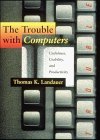The Trouble with ComputersUsefulness, Usability, and Productivity
Thomas K. Landauer
,
|

|
 Diese Seite wurde seit 9 Jahren inhaltlich nicht mehr aktualisiert.
Unter Umständen ist sie nicht mehr aktuell.
Diese Seite wurde seit 9 Jahren inhaltlich nicht mehr aktualisiert.
Unter Umständen ist sie nicht mehr aktuell.
 Zusammenfassungen
Zusammenfassungen
 Thomas Landauer explains and illustrates why computers are in trouble and why massive outlays for computing since 1973 have not resulted in comparable productivity payoffs. He marshals evidence that computers rarely improve the efficiency of the information work they are designed for, because they are too hard to use and do too little that is sufficiently useful. Landauer proposes that emerging techniques for user-centred development can turn the situation around - through task analysis, iterative design, trial use and evaluation, computer systems can be made into powerful tools for the service economy.
Thomas Landauer explains and illustrates why computers are in trouble and why massive outlays for computing since 1973 have not resulted in comparable productivity payoffs. He marshals evidence that computers rarely improve the efficiency of the information work they are designed for, because they are too hard to use and do too little that is sufficiently useful. Landauer proposes that emerging techniques for user-centred development can turn the situation around - through task analysis, iterative design, trial use and evaluation, computer systems can be made into powerful tools for the service economy. Despite enormous investments in computers over the last twenty years, productivity in the very service industries at which they were aimed virtually stagnated everywhere in the world.
If computers are not making businesses, organizations, or countries more productive, then why are we spending so much time and money on them? Cutting through a raft of technical data, Thomas Landauer explains and illustrates why computers are in trouble and why massive outlays for computing since 1973 have not resulted in comparable productivity payoffs. Citing some of his own successful research programs, as well as many others, Landauer offers solutions to the problems he describes.
While acknowledging that mismanagement, organizational barriers, learning curves, and hardware and software incompatibilities can play a part in the productivity paradox, Landauer targets individual utility and usability as the main culprits. He marshals overwhelming evidence that computers rarely improve the efficiency of the information work they are designed for because they are too hard to use and do too little that is sufficiently useful. Their many features, designed to make them more marketable, merely increase cost and complexity. Landauer proposes that emerging techniques for user-centered development can turn the situation around. Through task analysis, iterative design, trial use, and evaluation, computer systems can be made into powerful tools for the service economy.
Landauer estimates that the application of these methods would make computers have the same enormous impact on productivity and standard of living that were the historical results of technological advances in energy use (the steam engine, electric motors), automation in textiles and other manufacture, and in agriculture. He presents solid evidence for this claim, and for a huge benefit-to-cost ratio for user-centered design activities backed by descriptions of how to do these necessary things, of promising applications for better computer software designs in business, and of the relation of user-centered design to business process reengineering, quality, and management.
Despite enormous investments in computers over the last twenty years, productivity in the very service industries at which they were aimed virtually stagnated everywhere in the world.
If computers are not making businesses, organizations, or countries more productive, then why are we spending so much time and money on them? Cutting through a raft of technical data, Thomas Landauer explains and illustrates why computers are in trouble and why massive outlays for computing since 1973 have not resulted in comparable productivity payoffs. Citing some of his own successful research programs, as well as many others, Landauer offers solutions to the problems he describes.
While acknowledging that mismanagement, organizational barriers, learning curves, and hardware and software incompatibilities can play a part in the productivity paradox, Landauer targets individual utility and usability as the main culprits. He marshals overwhelming evidence that computers rarely improve the efficiency of the information work they are designed for because they are too hard to use and do too little that is sufficiently useful. Their many features, designed to make them more marketable, merely increase cost and complexity. Landauer proposes that emerging techniques for user-centered development can turn the situation around. Through task analysis, iterative design, trial use, and evaluation, computer systems can be made into powerful tools for the service economy.
Landauer estimates that the application of these methods would make computers have the same enormous impact on productivity and standard of living that were the historical results of technological advances in energy use (the steam engine, electric motors), automation in textiles and other manufacture, and in agriculture. He presents solid evidence for this claim, and for a huge benefit-to-cost ratio for user-centered design activities backed by descriptions of how to do these necessary things, of promising applications for better computer software designs in business, and of the relation of user-centered design to business process reengineering, quality, and management. Dieses Buch erwähnt ...
Dieses Buch erwähnt ...
 Zitationsgraph
Zitationsgraph
 Zitationsgraph (Beta-Test mit vis.js)
Zitationsgraph (Beta-Test mit vis.js)
 2 Erwähnungen
2 Erwähnungen 
 Co-zitierte Bücher
Co-zitierte Bücher
 Bibliographisches
Bibliographisches 
 Beat und dieses Buch
Beat und dieses Buch
Beat war Co-Leiter des ICT-Kompetenzzentrums TOP während er dieses Buch ins Biblionetz aufgenommen hat. Die bisher letzte Bearbeitung erfolgte während seiner Zeit am Institut für Medien und Schule. Beat besitzt weder ein physisches noch ein digitales Exemplar. Aufgrund der wenigen Einträge im Biblionetz scheint er es nicht wirklich gelesen zu haben. Es gibt bisher auch nur wenige Objekte im Biblionetz, die dieses Werk zitieren.










 Computer
Computer Design
Design Software
Software Usability
Usability







 Biblionetz-History
Biblionetz-History